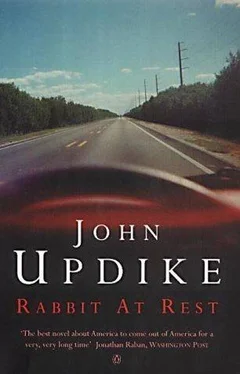John Updike - Rabbit At Rest
Здесь есть возможность читать онлайн «John Updike - Rabbit At Rest» весь текст электронной книги совершенно бесплатно (целиком полную версию без сокращений). В некоторых случаях можно слушать аудио, скачать через торрент в формате fb2 и присутствует краткое содержание. Жанр: Современная проза, на английском языке. Описание произведения, (предисловие) а так же отзывы посетителей доступны на портале библиотеки ЛибКат.
- Название:Rabbit At Rest
- Автор:
- Жанр:
- Год:неизвестен
- ISBN:нет данных
- Рейтинг книги:4 / 5. Голосов: 1
-
Избранное:Добавить в избранное
- Отзывы:
-
Ваша оценка:
Rabbit At Rest: краткое содержание, описание и аннотация
Предлагаем к чтению аннотацию, описание, краткое содержание или предисловие (зависит от того, что написал сам автор книги «Rabbit At Rest»). Если вы не нашли необходимую информацию о книге — напишите в комментариях, мы постараемся отыскать её.
***
Amazon.com Review
It's 1989, and Harry "Rabbit" Angstrom feels anything but restful. In fact he's frozen, incapacitated by his fear of death-and in the final year of the Reagan era, he's right to be afraid. His 55-year-old body, swollen with beer and munchies and racked with chest pains, wears its bulk "like a set of blankets the decades have brought one by one." He suspects that his son Nelson, who's recently taken over the family car dealership, is embezzling money to support a cocaine habit.
Indeed, from Rabbit's vantage point-which alternates between a winter condo in Florida and the ancestral digs in Pennsylvania, not to mention a detour to an intensive care unit-decay is overtaking the entire world. The budget deficit is destroying America, his accountant is dying of AIDS, and a terrorist bomb has just destroyed Pan Am Flight 103 above Lockerbie, Scotland. This last incident, with its rapid transit from life to death, hits Rabbit particularly hard:
Imagine sitting there in your seat being lulled by the hum of the big Rolls-Royce engines and the stewardesses bring the clinking drinks caddy… and then with a roar and giant ripping noise and scattered screams this whole cozy world dropping away and nothing under you but black space and your chest squeezed by the terrible unbreathable cold, that cold you can scarcely believe is there but that you sometimes actually feel still packed into the suitcases, stored in the unpressurized hold, when you unpack your clothes, the dirty underwear and beach towels with the merciless chill of death from outer space still in them.
Marching through the decades, John Updike's first three Rabbit novels-Rabbit, Run (1960), Rabbit Redux (1971), and Rabbit Is Rich (1981)-dissect middle-class America in all its dysfunctional glory. Rabbit at Rest (1990), the final installment and winner of the Pulitzer Prize, continues this brilliant dissection. Yet it also develops Rabbit's character more fully as he grapples with an uncertain future and the consequences of his past. At one point, for example, he's taken his granddaughter Judy for a sailing expedition when his first heart attack strikes. Rabbit gamely navigates the tiny craft to shore-and then, lying on the beach, feels a paradoxical relief at having both saved his beloved Judy and meeting his own death. (He doesn't, not yet.) Meanwhile, this all-American dad feels responsible for his son's full-blown drug addiction but incapable of helping him. (Ironically, it's Rabbit's wife Janice, the "poor dumb mutt," who marches Nelson into rehab.)
His misplaced sense of responsibility-plus his crude sexual urges and racial slurs-can make Rabbit seems less than lovable. Still, there's something utterly heroic about his character. When the end comes, after all, it's the Angstrom family that refuses to accept the reality of Rabbit's mortality. Only Updike's irreplaceable mouthpiece rises to the occasion, delivering a stoical, one-word valediction: "Enough."













